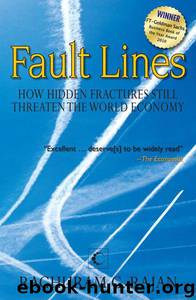Fault Lines by Rajan Raghuram G

Author:Rajan, Raghuram G [Rajan, Raghuram G]
Language: eng
Format: azw3
Tags: NON-FICTION/ECONOMICS
Publisher: Harper Collins India
Published: 2012-09-12T04:00:00+00:00
Shareholders
One question arises immediately: If indeed the aggressive banks were clearly identifiable, why did the market not punish them before the crisis? Banks that ranked in the worst quartile of performance during the crisis had much higher stock returns in the year before the crisis, 2006, than banks that ranked in the best quartile.21 So the market seemed to support the behavior of the risk takers by boosting their stock price before the crisis.
Those who believe that markets are grossly inefficient would quickly construe this outcome as evidence that the stock market typically gets it wrong, and that theories that markets efficiently aggregate all public information into prices —versions of the “efficient markets hypothesis ” —are hopelessly misguided. Yet nothing in the theory says the market should be spot on all the time. The market may not have full information—after all, even regulators were later surprised by the quantities of asset-backed securities the banks carried both on and off their balance sheets. Moreover, even if it assigns appropriate probabilities to all possible events, only one of those events will be realized. Viewed with the benefit of hindsight, especially if an extreme event occurs, the market will seem as if it got matters wrong, and indeed it will have done so. But this is not to say that anyone could have consistently done better. In the jargon of economists, that the market is believed to have rational expectations about events does not mean that it has perfect foresight.
More generally, there is a danger in judging risk taking while looking back from the depths of a crisis, especially one as severe as the recent one. From that perspective, any risk taking beforehand seems irresponsible, redolent of mismanagement. Conservatism seems prescient and astute—indeed, it seems so much in tune with the times that it becomes the strategy of choice after the crisis, when in fact more risk taking would be appropriate. However, the right way to judge actions taken before the crisis is whether the risk taking was expected to be profitable.
And it may well have been that shareholders, protected by limited liability from bearing the extreme losses induced by tail risk (because shareholders can simply abandon their shares when their value hits zero, whereas partners in an unlimited-liability partnership must repay the money owed to debt holders or forfeit their wealth), deemed the expected profits from taking on tail risk worthwhile— they took the gains while the debt holders and the taxpayer absorbed the tremendous losses. Put differently, Jimmy Cayne (of Bear Stearns), Dick Fuld (of Lehman), and Chuck Prince (of Citigroup) might still be feted as giants of the financial industry had events followed the most probable course. This is not to say that the risks they took on were good for society, only that they may have been reasonable bets for shareholders to take.
The actions of corporate boards, which are the representatives of shareholders, might give us a sense of where shareholder interests lay. Not all boards were equally competent,
Download
This site does not store any files on its server. We only index and link to content provided by other sites. Please contact the content providers to delete copyright contents if any and email us, we'll remove relevant links or contents immediately.
International Integration of the Brazilian Economy by Elias C. Grivoyannis(108420)
The Radium Girls by Kate Moore(12012)
Turbulence by E. J. Noyes(8039)
Nudge - Improving Decisions about Health, Wealth, and Happiness by Thaler Sunstein(7689)
The Black Swan by Nassim Nicholas Taleb(7101)
Rich Dad Poor Dad by Robert T. Kiyosaki(6600)
Pioneering Portfolio Management by David F. Swensen(6280)
Man-made Catastrophes and Risk Information Concealment by Dmitry Chernov & Didier Sornette(6001)
Zero to One by Peter Thiel(5782)
Secrecy World by Jake Bernstein(4738)
Millionaire: The Philanderer, Gambler, and Duelist Who Invented Modern Finance by Janet Gleeson(4460)
The Age of Surveillance Capitalism by Shoshana Zuboff(4273)
Skin in the Game by Nassim Nicholas Taleb(4232)
The Money Culture by Michael Lewis(4188)
Bullshit Jobs by David Graeber(4177)
Skin in the Game: Hidden Asymmetries in Daily Life by Nassim Nicholas Taleb(3986)
The Dhandho Investor by Mohnish Pabrai(3756)
The Wisdom of Finance by Mihir Desai(3726)
Blockchain Basics by Daniel Drescher(3571)
